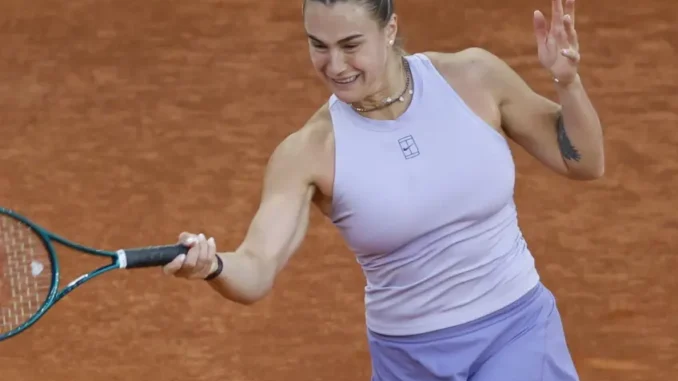
Aryna Sabalenka, the world No. 1 and a three-time Grand Slam champion, has turned the sting of childhood criticism into a powerful motivator as she storms through the 2025 French Open. After a commanding 6-2, 6-3 victory over Serbia’s Olga Danilovic in the third round, the 27-year-old Belarusian opened up about the harsh words of her early coaches, who branded her “stupid” and dismissed her potential to reach the pinnacle of tennis. Now, as she prepares to face Amanda Anisimova in the fourth round at Roland Garros, Sabalenka’s journey from a doubted youngster to a dominant force stands as a testament to her resilience and fiery spirit.
Growing up in Minsk, Sabalenka faced a coaching culture in Eastern Europe that she describes as brutally unforgiving. “I’ve always been quite motivated, and they didn’t have to push me,” she said after her win, her voice carrying a mix of defiance and pride. “But I have heard a lot. Saying I’m not smart enough, that I’m stupid, and I’ll never make it, and I don’t have anything to make it to the top.” Rather than let those words break her, Sabalenka used them as fuel, laughing off the skepticism with a confident, “We’ll see.” Her response to those early naysayers was blunt: “I guess I want to send a quick message to them to quit their job, because honestly, I think they know nothing and they better quit just to save other players.” Her words resonate as a call to protect young athletes from toxic coaching environments that, she believes, have shattered the dreams of many.
Sabalenka’s rise to the top has been anything but smooth. Since breaking into the WTA top 10 in 2019, she has faced personal and professional trials, including the sudden loss of her father, Sergey, to meningitis in 2019, and a crippling loss of confidence in her serve in 2022, when she racked up 440 double faults, including 18 in a single match against Coco Gauff. “I was just like, ‘Please, someone help me to fix this serve,’” she recalled, admitting to moments of despair where she resorted to underhand serves while fighting tears. With the help of her coaching team, including Anton Dubrov and Jason Stacy, she rebuilt her game, confronting her fears head-on. “I decided to stop working with a psychologist,” she said. “I realized that nobody other than me would help.” That determination led to her first Major at the 2023 Australian Open, followed by titles in 2024 at both the Australian and US Opens, cementing her as the world’s top-ranked player since September 2024.
Her performance at Roland Garros has been nothing short of dominant, conceding just 10 games across her first three matches. Against Danilovic, Sabalenka’s aggressive groundstrokes and improved serve overwhelmed her opponent, showcasing the power that broadcaster Mary Carillo once described as “big babe tennis personified.” Yet, she remains cautious about being labeled the favorite, deferring to Iga Swiatek, the three-time champion. “It’s tough to predict in women’s tennis, you know. Let’s just leave it on Iga since she won it, what, three times in a row, really, right?” Sabalenka said with a smile, her humility belying her fierce competitive edge.
Sabalenka’s journey reflects a broader critique of the harsh coaching methods prevalent in Eastern Europe. “The environment we have in our countries, which is like very tough and coaches are very brutal, you know, there is nothing nice about the way they work with their players,” she noted, contrasting it with the healthier systems she’s observed in the U.S. and elsewhere. Her own team, led by the young Dubrov, a former hitting partner, and Stacy, a martial arts expert, has fostered a supportive dynamic, complete with quirky rituals like Sabalenka signing Stacy’s head before matches. This camaraderie has helped her navigate setbacks, like her emotional Australian Open final loss to Madison Keys in January 2025, where she jokingly told her team, “I don’t want to see you for the next week,” before praising their efforts.
As she faces Anisimova, a powerful American ranked No. 16, Sabalenka’s mental fortitude will be tested. Her 2023 French Open semifinal run remains her best showing in Paris, and a fourth Major title would further silence her early doubters. “I was so angry,” she once said of being compared to Maria Sharapova as a child, a memory that still drives her to prove her unique worth. With 20 WTA singles titles and a relentless spirit, Sabalenka is not just rewriting her story but reshaping the narrative for future players, urging a shift away from the “aggressive mindset” that nearly broke her.
Leave a Reply